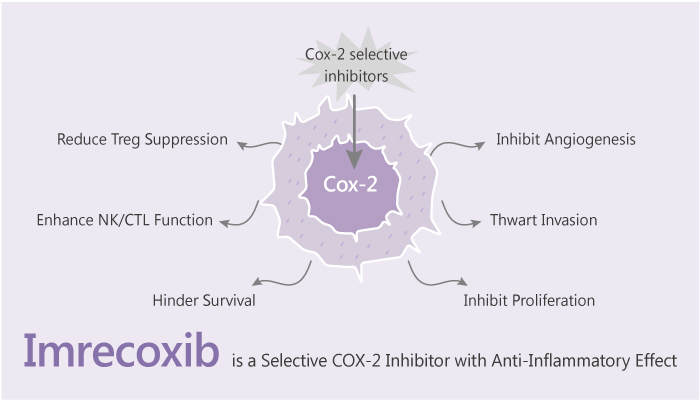Cyclooxygenase (COX), also named prostaglandin-endoperoxide synthase (PTGS), is a kind of enzymes responsible for the formation of prostanoids. It has three types, COX-1, COX-2 and COX-3. However, COX-3 is reported not functional in humans. COX is a hot target for anti-inflammatory drugs. Some drugs have inhibitory effect on COX-1, some have on COX-2, and others may act on both of the two isoforms.
COX-2 remains unexpressed under normal conditions in body. Once tissue damage or inflammation happens, COX-2 exhibits increased levels. Accordingly, researchers discovered various COX-2 inhibitors for inflammation treatment.
Imrecoxib, a selective COX-2 inhibitor, exhibits potent anti-inflammatory activity. The details are as follows.

Above all, researchers want to konw whether Imrecoxib inhibits COX-1 or COX-2. In cellular assay, Imrecoxib dose-dependently inhibits COX-1 and COX-2 activity, with IC50s of 115 and 18 nM, respectively. Moreover, Imrecoxib dcreases COX-2 mRNA level in LPS-induced U937 cells. Nevertheless, Imrecoxib exhibits no effect on COX-1 mRNA level.
According to the great potency of Imrecoxib in vitro, researchers go on to experiment in animals. As expected, Imrecoxib suppresses carrageenan-induced paw edema. The administration of the inhibitor is 1 hour before carrageenan induction.
Not only that, Imrecoxib displays excellent anti-inflammatory in adjuvant-induced arthritis (AIA) model. Imrecoxib (10 or 20 mg/kg/day) reduces the secondary paw swelling after immunization. It does not obviously affect the index of thymus and spleens.
To summarize, Imrecoxib is a moderately selective COX-2 inhibitor, and exhibits anti-inflammatory effect via inhibition of COX-2 mRNA expression.
References:
1. Chen XH, et al. Acta Pharmacol Sin. 2004 Jul;25(7):927-31.